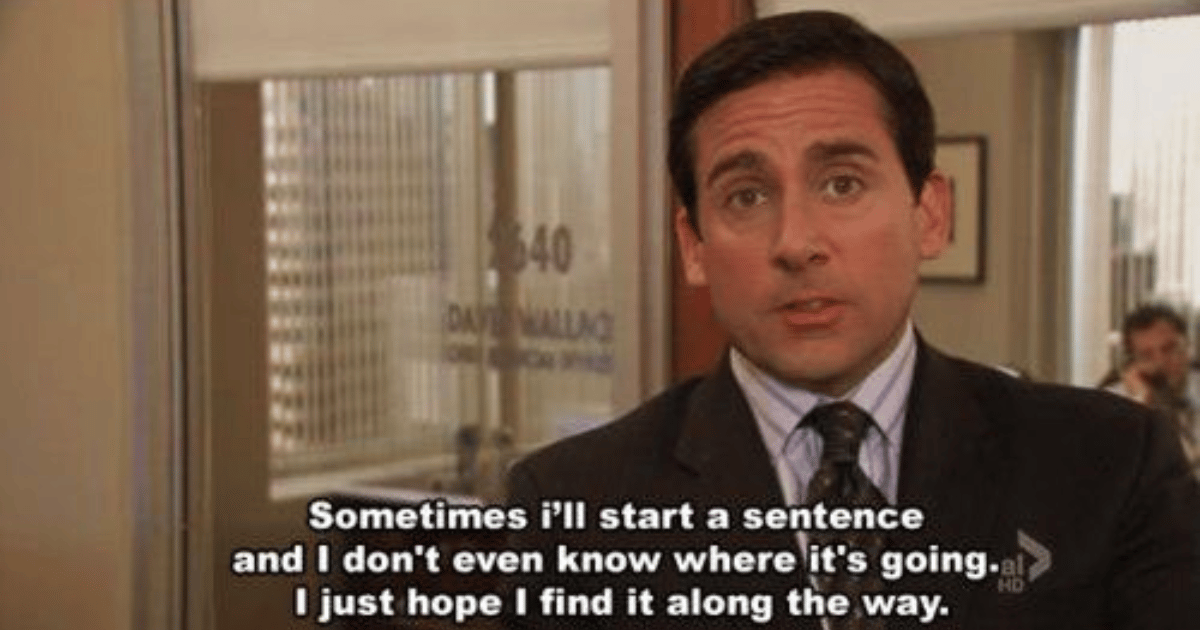- The Warrior Poet
- Posts
- Communication Breakdown
Communication Breakdown
It's always the same.

Good Brain, Bad Brain
Overthinking has a cost (a big one).
But it also has some benefits.
Occasionally chewing on our neurotic impulses creates thorny questions.
And if there’s one thing better than answers – especially in the age of AI – it’s great questions.
Last week:
Jeff: “You forgot to send the invite.”
Me: “Doh!”
Yet again, my calendar workflow has failed me. 😖
I immediately send him the invite.
But then I sit there for a minute.
I think, “Uhh I guess I should respond to his message saying something like, ‘My bad, fixed now!’”
But… he knows it’s fixed. That’s how email and calendars work.
Yet, it sticks in my craw.
(Not sure about you, but I’m good for having one craw a year tops. I’m at my quota.)
Positive Comms
The issue is positive communication.
I don’t mean “sunny” or “happy.”
Positive communication means:
(a) we as a team share information actively and that
(b) nothing is left to assumption.
It’s unlikely that Jeff will see the event pop on his calendar unless he’s looking at it.
And if he’s like me in my last corporate job, then he’s autofiltering all those automated emails from our own calendars that crowd our inbox.
(Like seriously, 1990s, we couldn’t design this better?? 🙄)
❌ But what if I placed the invite on the wrong date?
❌ What if my invite ends up in Spam?
Positive comms are how you prevent errors and dropped balls.
Signs of Affirmation
Aside from clarity, it tells Jeff, my partner for this project:
✅ Hey, we’re linked up.
✅ Thanks for the catch.
✅ I’m not a d— who’s too busy for you.
So I responded, “Oops, my bad. Good now.”
It took 5 seconds, but many “leaders” are so focused on whack-a-mole that they pride themselves on never being the last one to respond.
…to their detriment (and their team’s).
More Variables
I mean, it’s not like I was thinking through all this consciously at the time.
It was more of a gut feel. To the “Good Brain, Bad Brain” point above, I only untangled this all afterward by… mulling.
How much communication is too much depends on a lot of factors:
➟ Culture
➟ Situation
➟ Personality
➟ Environment
➟ Length of the relationship
➟ Stakes for the situation
➟ Cost of communication
That last one refers less to monetary cost and more to the churn that excessive communication creates for the participants. Especially the recipients.
For instance, if you communicate too much on the radio during a military operation, you prevent others from calling for help if they need it. And you destroy the focus of everyone from what’s right in front of them (like people shooting at them).
🥰 Or to take a dating example, you’ll leave no room for suspense and rapport to build.
We each have our own internal compass that tells us how to communicate.
But leaders running a system can’t rely on gut feel – especially when money, customers, and (maybe) lives are on the line.
Intent is not enough. As my prof used to say in the only science-y part of my political science major, leaders need to “operationalize the variables.”
You don’t rise to the level of your goals. You fall to the level of your habits [systems].
🔑 Implement a Comms System
Improvements That Raise Your Team’s Game
The first startup I joined was a women’s fashion startup. 👗 It was (fun) chaos.
Within a month it had given me the inspiration needed to codify a set of communication principles – summarized here:
Don’t assume: make positive comms the norm.
Do assume positive intent.
Avoid different terms for the same thing.
Avoid similar terms for different things.
Most names for things are too complicated.
Punchy = memorable. Short = consumable. And if it’s long, make sure it’s deep.
Write it down. An idea off paper is a mustang.
Docs >>> slide decks – unless you’re pitching.
Beware channel. Beware audience.
Say the important things so often that you’re sick of hearing yourself.
Try it, and let me know how this works for your team.
❤️ Andrew
Coda
I was honored to give a session on mindset and mental health at my Harvard Business School reunion this weekend. My buddy Jeff Boss joined me. He’s a fellow SEAL and mental health professional.
We talked about grit, burnout, anxiety, fear, failure, loss, and teamwork. I wrote down takeaways from the session here.

Jeff talking through the polyvagal chart
(If the idea of an Ivy League reunion sounds pretentious to you, check out my take.)
Outro
“Life doesn’t need a soundtrack. Life is a soundtrack.”
—Sri
To regular readers and audiophiles, what’s coming next is obvious.
(I see you, Nick S. 🤗)
One of the best recordings — of one of the best songs — in the history of mankind:
Cheers
Find me at thewarriorpoet.com and on LinkedIn.
Feeling stuck at the same level for years? Reach out to talk with me on hubble. 🙌
Get unstuck, and crush it. Double period.

